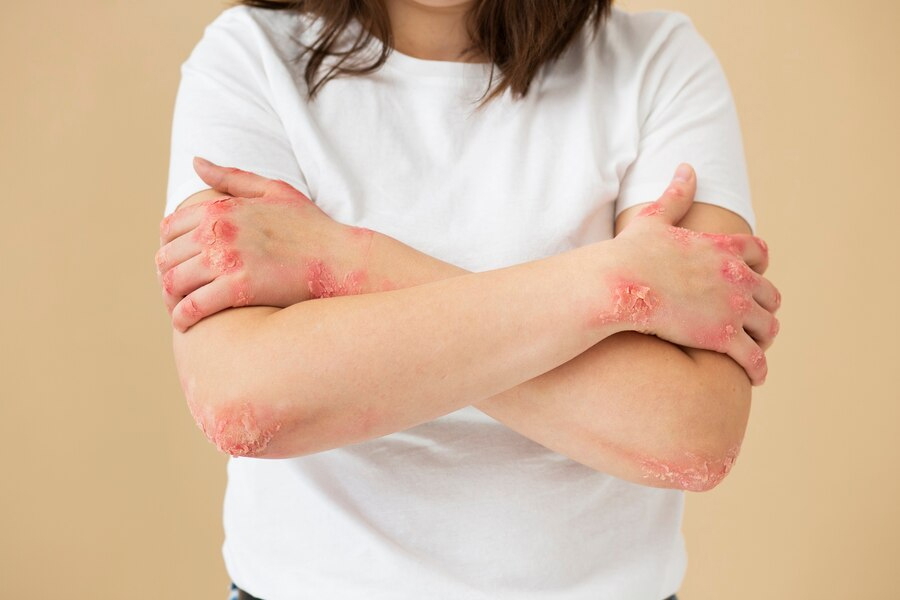In recent years, India has witnessed a notable rise in cases of atopic dermatitis, a condition characterised by itching and inflamed patches of skin. Once considered rare, it has now become increasingly prevalent, affecting individuals across various demographics. Statistics reveal that approximately 5.9% of adults in India grapple with atopic dermatitis, with 4.4% experiencing its severe manifestations. This surge can be attributed to a multitude of factors, including urbanisation, shifting lifestyles, climate alterations like air pollution and extreme temperatures, and potentially genetic predispositions.
“The summer season can greatly impact those with sensitive skin conditions like atopic dermatitis. Hot and humid weather often leads to increased sweating, which can exacerbate symptoms like dry, cracked skin and inflammation, particularly in areas like the armpits and elbows. Additionally, summer allergens such as pollen can worsen allergy symptoms and skin irritation,” shares Dr Sumit Sethi, Medical Director, DermaStation Skin Clinic, Janakpuri, Delhi.
Frequent application of sunscreen, increased showers and swimming, can also irritate sensitive skin. The season necessities a derm backed solution and science backed approach to skincare to better manage atopic dermatitis like conditions.
Understanding Atopic Dermatitis: Lack of awareness and care required
One of the most common forms of eczema, people experiencing atopic dermatitis have inflamed, itchy skin, which might ooze fluid resulting in thick, hardened skin patches. Individuals with such skin conditions often have a compromised skin barrier, increasing their susceptibility to bacterial and viral infections.
Also Read: Debunking Top 5 Myths About Atopic Dermatitis
Dr Sethi explains, “Owing to lack of awareness often leads to misdiagnosis by patients. With growing popularity of social media and influencer marketing, it is easy to be swayed by popular drugstore products, however, different skin types and conditions require a personalised approach and care. Using products not suited for sensitive skin conditions like atopic dermatitis can cause further discomfort, resulting in pain, burning sensations, and worsened flare-ups.”
Choose Moisturising Ingredients and Formulations That Soothe and strengthen a Compromised Skin Barrier
“Although there’s no permanent cure for atopic dermatitis, adopting a personalised skincare routine with products with moisturising ingredients is crucial. These products help retain moisture, strengthen the skin barrier, and alleviate dryness and irritation. Hydrating ingredients such as hyaluronic acid, ceramides, glycerine, shea butter, squalene, and panthenol are known for their potent moisturising properties and are indispensable for such sensitive skin conditions,” shares Dr Sethi.
It is recommended to also choose natural ingredients like colloidal oats, aloe vera, chamomile, calendula, liquorice extract, and coconut oil known for their soothing properties in treating this condition. Incorporating these ingredients into your skincare regimen can alleviate itching, irritation, and inflammation.
Oatmeal to the Rescue for Atopic Dermatitis

Colloidal oatmeal has a long history of dermatological benefits, with numerous clinical studies supporting its safety and efficacy. Rich in avenanthramides, colloidal oatmeal reduces inflammation by inhibiting pro-inflammatory cytokines, contributing to its anti-itch effect and supports endogenous ceramide production. Known for its anti-inflammatory and soothing properties, colloidal oatmeal also contains saponins, vitamins, flavonoids, potent antioxidants, and beta-glucan, making it a powerful ingredient for managing atopic dermatitis.
Also Read: Managing Atopic Dermatitis: Expert Shares Which Fabrics You Should Wear To Avoid Flare-Ups
Recognising its therapeutic potential, the US Food and Drug Administration (FDA) officially classified colloidal oatmeal as a skin protectant in 2003, capable of mitigating dryness, itching, and irritation.
Proven effective in improving microbial balance and skin barrier function due to its highly effective pH buffers, colloidal oatmeal neutralises elevated skin pH levels and significantly aids in relieving symptoms commonly associated with atopic dermatitis (AD), such as pruritus, skin irritation, and heightened skin sensitivity.
“The antioxidant properties of colloidal oats facilitate water absorption into the skin, while its lipid content provides emollient properties to fill in micro-cracks between skin cells, ultimately softening irritated skin. Topical application of colloidal oatmeal can enhance and restore the skin’s natural levels of essential lipids like ceramides, thereby aiding in the improvement and repair of the skin barrier and skin hydration,” explains Dr Sethi.
When integrating colloidal oatmeal in skincare routine, opt for formulations enriched with proteins, vitamins B and E, and nourishing lipids to aid in replenishing moisture. For people with sensitive skin conditions, it is beneficial to include oatmeal as an ingredient in daily products such as cleansers, body washes, bath soaks, moisturisers, and even shaving creams.
Oat-based moisturisers can improve the quality of life of patients with eczema-prone skin by 83%*1. Clinical studies have shown significant improvements in itchy and dry skin from day one, with a 61% improvement at 14 days 2. More importantly, long term usage of oat-based moisturizers can reduce steroid & anti-microbial usage in eczema prone skin by 21%.
Also Read: Do You Have Atopic Dermatitis? Here’s How It Can Put You At Risk Of Food Allergies
TLC for Sensitive Skin: The Do’s and Don’ts

In addition to adopting a customised skincare regimen, people with sensitive skin conditions need to take extra precautions and care to improve skin health. Here are some suggestions by Dr Sethi:
- Always consult a dermatologist with expertise in allergy and atopic conditions to understand care required to manage this condition as well as recommended products
- Replace hot showers with lukewarm baths and steer clear of harsh exfoliators
- Choose gentle cleansers that effectively cleanse without stripping away the skin’s natural oils.
- Proper safety, allergy, and tolerance testing are imperative to ensure that the regimen is safe and well-tolerated by those with atopic dermatitis
- Apply sunscreen with at least SPF 30 for optimal protection
While managing atopic dermatitis may pose various challenges, a better understanding of this skin condition and usage of the right products with gentle formulations rich in colloidal oatmeal can significantly help alleviate symptoms.

